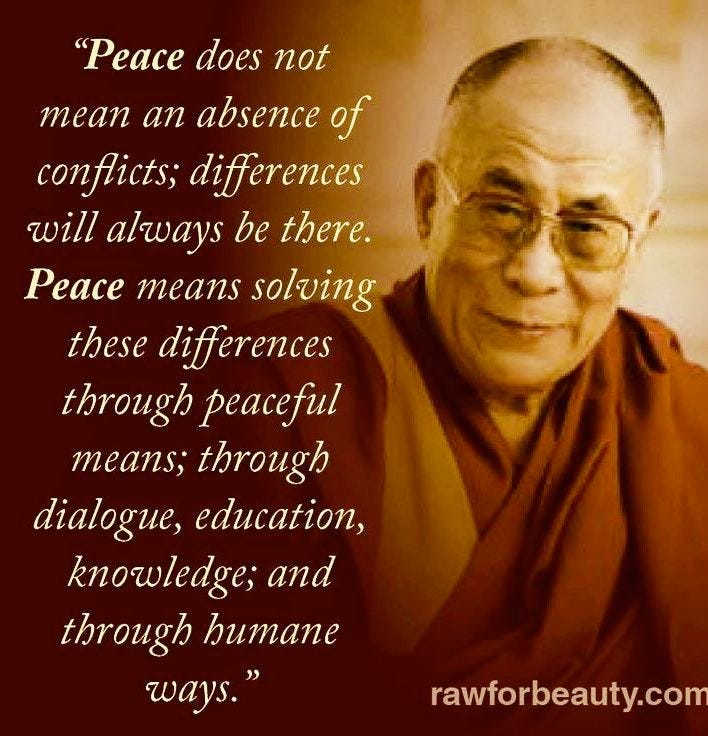Buddhism is Not Pure Evil
Christians make a grave error when they decry Buddhists as "demon-worshipers"
I get annoyed when some Christians, especially new converts like myself, attack Eastern religions mercilessly and equate them with demon worship (I know I did this at one point - forgive me!)
Reason being, not all ideologies are equal! Some Christians seem to see everything in black and white, as if anything that isn't Christ's Gospel is basically evil demon worship. That's not true at all in my opinion. and it's harmful!
Like, don't you know there are people in this world that ACTUALLY WORSHIP DEMONS?!
Literally, there are cults that worship Satan, go around doing horrible things to children, and gleefully commit other acts of unspeakable evil. I could link the receipts, but I think it’s far worse to spread that sort of thing. Even learning about it scars your soul. So, that sort of pure evil exists in the world, and you're going to equate this guy with THAT?:
4Now don't get me wrong - I'm not a perennialist. Many Christians fall into the other error, where they go too far and say "oh yeah Christ and the Buddha were saying the same thing, it's all love" blah blah blah.
I disagree. I think Christ is the Son of God and that He is more Good and Right than the Buddha was. Yet the Buddha was also a great guy! Heck, there are some arguments that the Buddha canonically should be called a Saint in the church.
When you decide to call yoga, Buddhist meditation, and other spiritual practices "demonic," you're conflating practices which actually help people and have a lot of good in them, with pure evil.
This is not only wrong, it actively drives people away from the church!
One of the major reasons that Christianity has become a laughingstock in the West (or was, seems to be changing) is that many so-called Christians have been loudly, harshly judgmental towards other faiths.
It seems like, to the mind of many Christians, the only two choices are to loudly denounce Buddhism as evil, or declare the Buddha and Christ to be on a level playing field. I don't think that either extreme is true...
My priest always says "the Evil One lives at the extremes." The truth is somewhere in the middle of those two poles, to me. Christ is King, yet the Buddha was also a good guy. Not all Buddhists are evil demon-worshipers we need to denounce in harsh language.
Let me leave you with a relevant quote from St. Basil the Great, a church father from the 4th century:
Let our use of books and learning in every case mirror the ‘icon’ of the honeybee. For such does not visit every flower in the same manner, neither does the honeybee attempt to fly off bearing the burden of the entire flower. Rather, once it derives that which is needful from the flower, it leaves the rest behind and takes flight.
So, too, if we are wise, once we derive from learning what resonates with truth, we too shall leave the rest behind and take flight. For is it not so that when we take a rose we avoid the thorns? So, too, let us approach diverse writings, harvesting the fruits that they offer for our objectives, while protecting ourselves from the damaging elements that may lie within them. In all our studies, let us take with us and take within us only what builds us up, and what leads us in the fulfillment of our mission…” (in RAISING LAZARUS edited by Stephen Muse, p 232-233)







I roughly agree with what you're saying. My problem with the Buddha is the part where he abandons his wife, child and kingdom, literally every one responsibility he had. Granted I don't know much about him, but I have yet to hear anything about him amends. All I hear is that he was enlightened and said and did nice things, I don't know what though I haven't really look into Buddhism. Then again the prophets from the old testament were also flawed.
Not a Christian myself, so read the below points with this in mind. I'm largely in agreement.
1. Being religious usually means thinking your religion is the best, or correct one, but this doesn't have to translate into chauvinism. You can see other religions as simply being incomplete. This has been a point made by Christian and Islamic theologians - that other cultures, religions, and civilizations were just recipients of an incomplete revelation.
In Islam there's this specific idea that the true, moral, monotheistic religion is perpetually showing up and perpetually being lost, and some scholars have even debated giving prophet status to Buddha. Obviously they think Islam is the last, best word on the subject, but have a certain sympathy for pre-Islamic axial age religions.
2. The term "pagan" was first applied to the polytheistic greco-roman religions. I think the critique of "paganism" kind of makes sense when you're talking about pre-axial age religions. I don't have much problem calling "pagan" religions that practiced human sacrifice - like Wotanism or Aztec religion - clearly evil, but as a critique of universal, moralist, axial age religions it makes less sense to me.